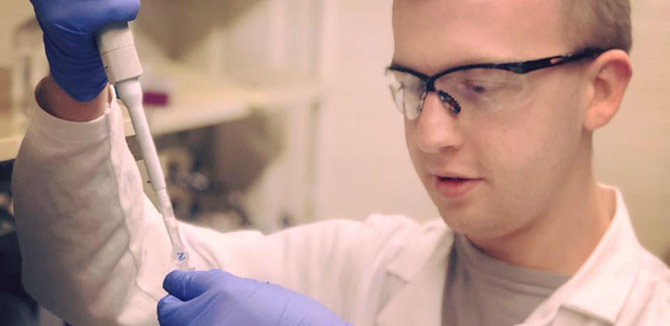A Passion for Research and Chemical Engineering
Austin Miller looks back on why he chose the MBP program and what he enjoys about his research project
By Austin Miller (MS '19)
Initially, I was attracted to the Master of Science in Biotechnology program (MBP) because the program was run through the chemical engineering department. I participated in undergraduate research through my school’s chemical engineering department and I absolutely loved the research I was doing. However, I felt like I didn't understand some of the stuff going on in the lab because I didn't have an engineering background.
I was excited to find a graduate program where I could take chemical engineering classes as well as participate in research in chemical engineering labs. I was also attracted to the certificate the program offers in Sustainability and Global Health. I advocated for sustainability projects on my undergraduate campus, and my research was focused on sustainable chemical production. I was excited to find a program that allowed me to integrate my interests in biotechnology and sustainability.
 The research focus of this program was one of the key reasons why I decided to join MBP. I loved participating in research as an undergraduate and I knew it was something that I wanted to continue in graduate school. Northwestern’s Center for Synthetic Biology, specifically, was a huge draw to the program. The research being done at Northwestern in synthetic biology is awesome, and there were professors like Dr. Keith Tyo, Dr. Joshua Leonard and Dr. Michael Jewett, who are big names in the field.
The research focus of this program was one of the key reasons why I decided to join MBP. I loved participating in research as an undergraduate and I knew it was something that I wanted to continue in graduate school. Northwestern’s Center for Synthetic Biology, specifically, was a huge draw to the program. The research being done at Northwestern in synthetic biology is awesome, and there were professors like Dr. Keith Tyo, Dr. Joshua Leonard and Dr. Michael Jewett, who are big names in the field.
Currently I am advised by Dr. Leonard and Dr. Tyo, who are both awesome preceptors and have amazing labs. I have learned so much from them as well as the students in their labs.
As for my research, here is some background information. Cells naturally have the ability to respond to their environment. They can respond to pH, temperature and the presence of specific chemicals. The ability of cells to respond to their environment has been manipulated and this has resulted in the development of biosensors. Microbes, such as E. coli, can be engineered to detect the presence of a chemical and fluoresce or produce a pigment if that chemical is present.
These engineered microbes can be used as diagnostic devices and allow for inexpensive and quick detection of things like water contaminants. However, the use of biosensors is limited by the fact that cells only respond to a limited number of chemicals naturally. In my research, I am focused on engineering transcription factors (which act as an on/off switch) that respond to chemicals that cells are not naturally responsive to. They turn expression of specific genes on or off depending on whether or not the chemical we want to detect is present. These engineered transcription factors have applications in metabolic engineering, diagnostic devices and scientific research.
Before my research is over, I hope to have identified a few functional biosensors. I am also really excited about some of the characterization we are doing of the biosensors that were engineered before I joined the lab. We are essentially confirming that the biosensors work the way we think they do. This characterization should open the door for some other exciting projects. I have learned so much through my research project already, and I am grateful that I have had the opportunity to work on such a cool project.
The research I have done through MBP has prepared me well for applying to PhD programs. I had applied to PhD programs out of undergrad, but I didn't feel like I was prepared. I am much more confident in my research abilities now and I am much more comfortable working independently in the lab.
My experiments have not gone perfectly (or even close to perfectly), but I think there is a lot you learn from things not going as planned in lab. Learning how to troubleshoot problems and how to plan experiments better so I don’t run into as many problems has been invaluable. I also feel much more confident presenting research thanks to MBP’s critical thinking course and the Industrial Advisory Board Meeting where we each presented an elevator pitch and a poster.
Overall, MBP has been an amazing opportunity. One of the coolest things about this program is getting to talk to other students about their research. We all have our niche area of research that we are passionate about. It’s awesome hearing about the projects other students are doing in research areas I don’t know as much about and seeing how much they care about their work. It’s really inspiring to be around students who are so passionate about their fields of research.


